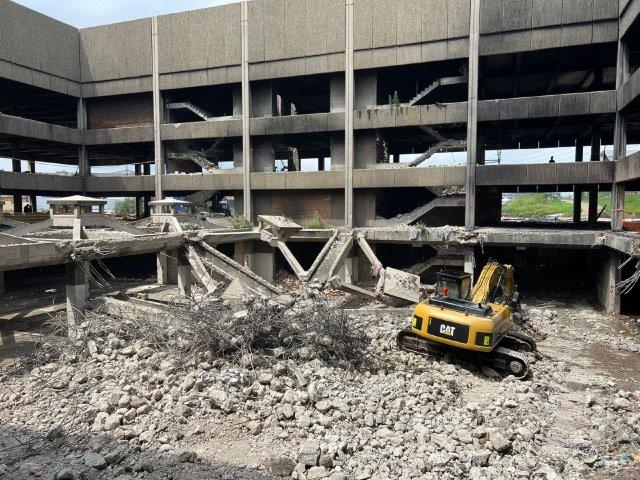
Supplied by Phoenecian Group
It is all systems go for the planned implosion of the Kaserne building in Johannesburg on 1 May, reports the City of Johannesburg (CoJ) Metropolitan Municipality Department of Housing. The building was condemned last year following structural damage after a fire. The implosion will be undertaken by Phoenecian Group, appointed by Johannesburg Social Housing Company (JOSCHO), an entity of the CoJ.
Phoenecian is working under Mbongiseni General Services cc to not only implode the five-storey building, but also prepare the site for its proposed redevelopment, says Contracts Manager Sne’ Khanyile. “This is quite an old building that has had some issues in the past with illegal tenants, resulting in the structure being condemned due to its structural defects. We have carried out work for the CoJ before. Implosion is a demolition technique especially well-suited for this type of pre-existing structure.”
The implosion will make way for a new Vertical Mixed Use (VMU) housing development that will accommodate 2 000 households as part of the larger precinct development. The VMU housing development, which includes a commercial and retail element, will create jobs during and post construction. There is also a taxi holding facility and petrol station site.
Other than Kaserne, the CoJ has already converted five buildings, and plans to convert and develop another five properties in the same precinct. It also plans to acquire another ten properties to be made available for social housing as part of the Inner City Housing Implementation Plan (ICHIP).
Phoenecian had to carry out minimal ‘soft’ work within the building itself from a structural perspective, as another sub-contractor that is part of the professional team cleared out all the internals. “We have had to pre-weaken certain structural elements such as the lift shafts and stairwells to ensure a successful implosion on the day,” says Kyle Perkin, Explosives Engineer: Demolition and Earthworks Division.
This is to ensure that these structures do not remain standing while the rest of the building collapses around it. “We are treating the building with caution and are observing all preparatory work we are undertaking to see if there are any sorts of movement within the building, of which there has been none to date,” confirms Perkin. The five-storey building includes a sub-basement.
Non-electronic detonation will be used, with the entire implosion expected to take a mere four seconds. An integral part of the project being coordinated by the CoJ is relocating the existing residents prior to D-Day, which is being carried out in two phases.
“There are a lot of bits and pieces to put together. It is quite a big puzzle. The actual implosion might be only four seconds, but there are three months of preparation required to reach that point,” says Khanyile. Perkin concurs: “There is a huge amount of planning involved as you only have a single attempt to implode the building successfully.”
Following the implosion, the Phoenecian bulk earthworks division will move in to break the rubble down further so it can be reused as a platform substrate for the next stage of the overall development of the site. “This is an excellent example of the full turnkey service we are able to offer our clients,” says Khanyile.
He concludes: “Our health and safety standards are at the centre of our business practices. We carry a 5 Star Platinum NOSA rating, a high standard that we strive to always maintain in everything we do.”

